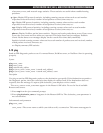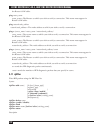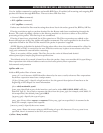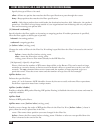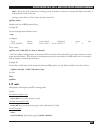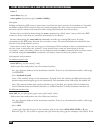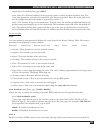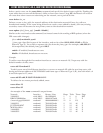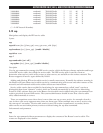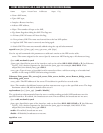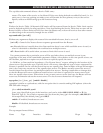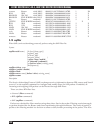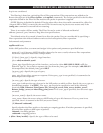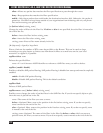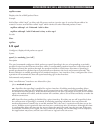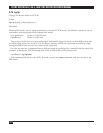
ASYNC ROUTER AR-P, AR-5, AND SYNC ROUTER REFERENCE MANUAL
205
*00004444 modem0 740109154a4b 3 13 46 P
*00000008 modem0 740109154a4b 3 13 46 P
*00000009 modem0 740109154a4b 3 13 46 P
*0000000a modem0 740109154a4b 3 13 46 P
*0000000b modem0 740109154a4b 3 13 46 P
*00000de2 modem0 740109154a4b 4 23 46 P
*00000201 modem0 740109154a4b 4 23 46 P
(* = LAN Network Number)
3.13 sap
Manipulate and display the IPX service table
Syntax
sap
sap add name iface [/frame_type] server_type server_addr [hops]
sap broadcast iface [/frame_type] [{enable | disable}]
sap delete name
sap -f
sap roundrobin [{on | off}]
sap update iface [/frame_type] [{enable | disable}]
Description
Use the sap command to manage the IPX service entries, which the Router software maintains and keeps
in the IPX service table, also called the service table. The IPX service table is used by clients to
determine what services, such as file servers or print servers, are available on the remote network. The
Router supports all service types defined by Novell.
Adding and deleting IPX service-table entries is usually unnecessary. Normally the software running in
the Router will learn about service-table entries by communicating with servers and other routers on the
network, and will maintain valid service tables without user intervention.
Service -table entries that are added by hand using the sap command are called “static” entries to
distinguish them from “dynamic” entries, which are learned automatically by the Service Advertising
Protocol (SAP) software that runs in the Router. Service-table entries added using the sap command can
replace previously learned SAP entries. The system administrator should be sure that a service-table
entry added manually is correct.
There are sometimes cases where there is more than one way to use a service. An example of such a
case is when a file server supports more than one frame type. When multiple ways to use a service exist,
the concept of “secondary” Service table entries is used. In certain circumstances, secondary Service
table entries are used when primary entries are deleted using the sap delete command.
Subcommands and parameters
sap
Issue the sap command without parameters to display the contents of the Router’s service table. The
routes are displayed in six columns:



